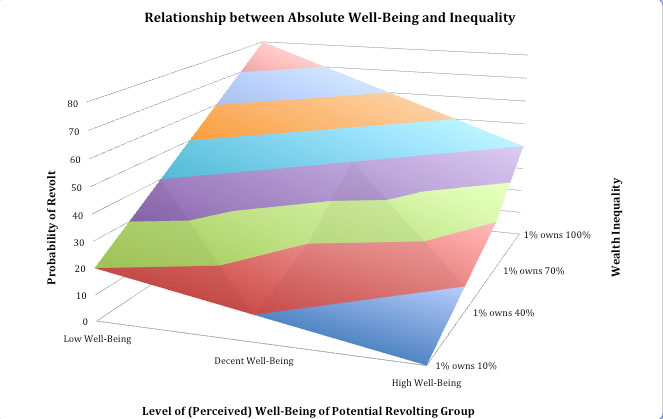Economics, Democracy
Piketty, Revolution and Inequality: A Reply to Schliesser
Eric Schliesser has written a thoughtful and even-handed criticism of my post on Piketty and social stability. Eric is worried that I did not focus enough on the fact that simple perceptions among the public about inequality, fairness and injustice are major contributing factors to revolution. He is surely right about this, and it gives me the chance to clarify my argument.
My core claim is that Piketty cannot vindicate his view that wealth inequality leads to (some form of) instability without looking at the absolute level of well-being among the potentially destabilizing or revolting group. The problem is that my post may have given the impression that I think there is some level of absolute well-being at which inequality will not produce instability. That’s an empirical claim that Eric is right I am not equipped to assess. However, to clarify, my claim is probabilistic, namely that as the absolute level of well-being of the potentially revolting group increases, the probability that the same level of inequality will produce instability/revolt decreases. And this empirical claim is generic enough that I feel safe assuming it. So consider the following graph:
The graph illustrates a potential relationship between the probability of revolt, absolute well-being and the level of inequality. I suggest that at a high level of well-being and a low level of wealth inequality, revolt is very unlikely, whereas at a low level of well-being and a high level of inequality, revolt is very likely. But if well-being is high and inequality is high, or if well-being is low and inequality is low, then the probability of revolt is low.
If I am right about this, then I think the argument of my previous post stands. To vindicate his view that inequality generates social stability, Piketty must explain how inequality and absolute well-being are related. Otherwise, we have no reason to accept his claim about the connection between inequality and instability. This further compounds the main weakness in Piketty’s argument, namely that he’s given us no reason to think we’re approaching a destabilizing level of inequality any time soon.
Also notice that I’ve phrased the x-axis in terms of the perceived level of well-being, which allows me to partially take on Eric’s worry that I didn’t focus on social perceptions. If people think their well-being is low, then that is really what matters as far as motivating their behavior. Factors concerning, say, a perceived slight by the elite against the populace, will also factor into the probability of revolt, given that the two dimensions (well-being and inequality) don’t explain all the probability variance.
So I’m grateful to Eric for the opportunity to clarify my argument.


